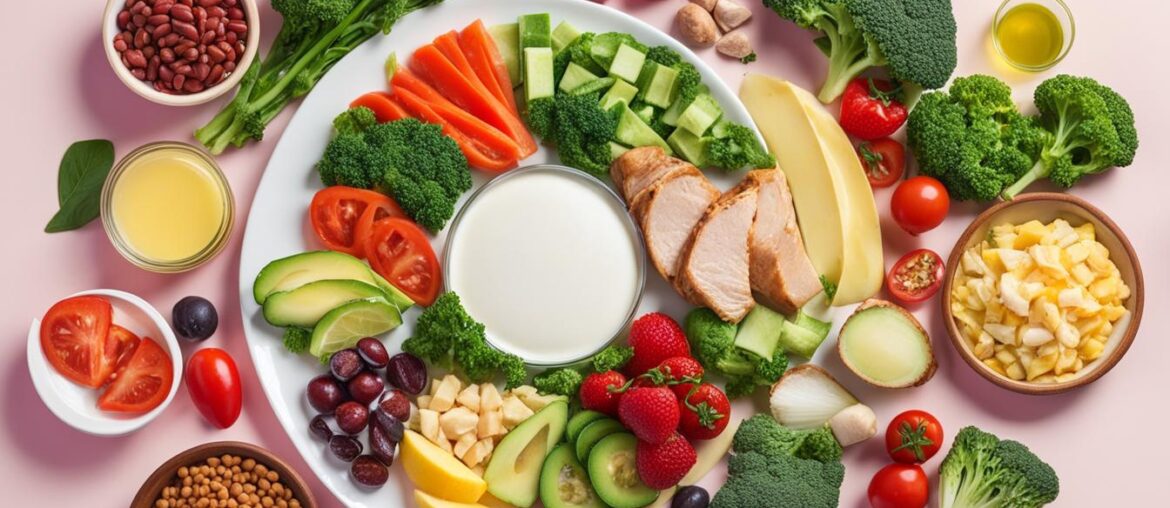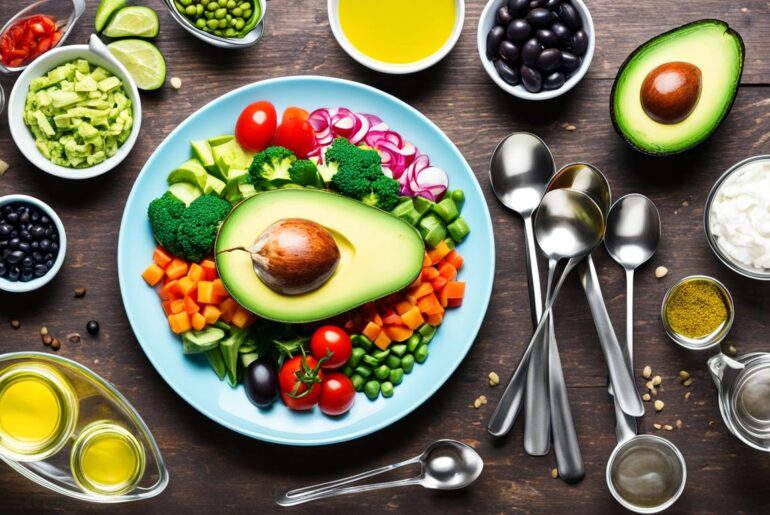Welcome to my article on the keto diet daily menu, an effective weight loss plan that focuses on keto-friendly meals. If you’re looking for weight loss tips and a diet that can help you achieve your goals, the ketogenic diet might be the answer.
The keto diet is a low carb and high fat diet that has gained popularity worldwide for its potential in promoting weight loss and improving overall health. By reducing your carb intake and increasing your fat consumption, you can put your body into a state of ketosis. In this state, your body uses fat as its primary source of energy, leading to effective weight loss.
Following a well-planned keto meal plan can provide you with the right balance of nutrients while also helping you shed those extra pounds. It’s essential to include a variety of keto-friendly foods in your daily menu, such as eggs, poultry, fatty fish, meat, full-fat dairy, nuts and seeds, avocados, and non-starchy vegetables.
Throughout this article, I will guide you through the basics of the ketogenic diet, offer tips on creating a keto-friendly meal plan, provide a sample keto menu for one week, suggest keto-friendly snack options, and share a simple ketogenic shopping list.
Stay tuned for effective weight loss tips and information on how to incorporate the keto diet into your daily routine. Whether you’re a beginner or already familiar with the keto lifestyle, there’s something for everyone.
Let’s dive into the world of keto and discover the path to achieving your weight loss goals!
Understanding the Ketogenic Diet Basics
The ketogenic diet, also known as the keto diet, is a low carb and high-fat diet that has gained popularity for its potential weight loss benefits. By significantly reducing carbohydrate intake and increasing fat consumption, the body enters a state of ketosis. In this state, the body shifts from using glucose as its primary source of energy to burning fat for fuel. This metabolic adaptation can lead to effective weight loss and improved overall health.
The key principle of the ketogenic diet is to limit carbohydrate intake to a minimum. Typically, carbohydrates make up only 5-10% of daily calorie intake on the keto diet, while fats make up 70-75% and proteins make up 15-20%. By drastically reducing carbohydrates, the body’s insulin levels decrease, and it starts to burn stored fat for energy.
The ketogenic diet has been shown to be effective for weight loss because it can help control hunger and increase satiety. When following a low carb diet, blood sugar and insulin levels remain stable, which helps reduce cravings and overeating. The high fat intake also provides a feeling of fullness, making it easier to adhere to the diet and maintain a calorie deficit.
However, it is important to note that not all fats are created equal. To ensure the diet is balanced and nutritious, it is essential to choose healthy fats such as avocados, nuts, seeds, olive oil, and fatty fish. These sources of fat provide essential nutrients and promote heart health, unlike unhealthy saturated and trans fats found in fried foods and processed snacks.
“The ketogenic diet is an effective approach for weight loss due to its ability to reduce hunger and increase satiety. By limiting carbohydrate intake and opting for healthy fats, individuals can achieve sustainable weight loss and improve their overall health.”
To optimize the ketogenic diet, it is important to monitor carbohydrate intake and choose low carb options such as non-starchy vegetables, berries, and small portions of nuts. Additionally, incorporating moderate amounts of high-quality protein sources like lean meats, poultry, and eggs can support muscle maintenance and repair.
Overall, understanding the basics of the ketogenic diet is crucial for successful weight loss and improved health. By following a low carb, high-fat diet and choosing healthy fats, it is possible to achieve sustainable weight loss and promote overall well-being.
Table 1: Macronutrient Distribution on the Ketogenic Diet
| Macronutrient | Percentage of Daily Calories |
|---|---|
| Carbohydrates | 5-10% |
| Fats | 70-75% |
| Proteins | 15-20% |
Table 1 provides an overview of the macronutrient distribution on the ketogenic diet. By limiting carbohydrates to 5-10% of daily calorie intake and increasing fats to 70-75%, the body is encouraged to enter a state of ketosis, leading to effective weight loss.
Creating a Keto-Friendly Meal Plan
Switching to a ketogenic diet can be overwhelming, but it doesn’t have to be difficult. The key to success is creating a well-planned keto meal plan that includes a variety of delicious and satisfying dishes while keeping your carb intake low. By focusing on reducing carbs and increasing the fat and protein content of your meals, you can enjoy the benefits of the keto diet and achieve your weight loss goals.
When creating your keto meal plan, it’s important to choose foods that are low in carbs but high in healthy fats. Here are some keto-friendly foods to incorporate:
- Eggs: Whether scrambled, fried, or in omelets, eggs are a versatile and nutritious staple in the keto diet.
- Poultry: Chicken and turkey are lean sources of protein that can be enjoyed in various keto recipes.
- Fatty Fish: Salmon, mackerel, and sardines are rich in omega-3 fatty acids and make excellent additions to your keto menu.
- Meat: Opt for grass-fed beef, pork, and lamb to ensure you’re getting quality protein and healthy fats.
- Full-Fat Dairy: Include options like butter, cheese, and cream to add flavor and richness to your meals.
- Nuts and Seeds: Almonds, walnuts, chia seeds, and flaxseeds are excellent sources of healthy fats and fiber.
- Nut Butter: Choose sugar-free nut butter options like almond or peanut butter for a tasty and satisfying snack.
- Oils Rich in Healthy Fats: Use olive oil, coconut oil, and avocado oil for cooking and dressing your keto dishes.
- Avocados: This creamy fruit is packed with healthy fats and can be enjoyed in salads, smoothies, or simply sliced.
- Non-Starchy Vegetables: Include leafy greens, broccoli, cauliflower, zucchini, and bell peppers to add nutrients and variety to your meals.
- Condiments: Opt for keto-friendly options like mayonnaise, mustard, hot sauce, and herbs and spices to enhance the flavors of your dishes.
While planning your meals, it’s equally important to limit or avoid foods that are high in carbs. These include bread, sweets, pasta, grains, starchy vegetables, beans, and fruits. Instead, choose low-carb alternatives and focus on whole, unprocessed foods.
When it comes to beverages, opt for sugar-free options that won’t interfere with your ketosis. Water, sparkling water, unsweetened coffee, and tea are great choices to stay hydrated and satisfied throughout the day.
By following a well-crafted keto-friendly meal plan, you can enjoy delicious and satisfying meals while successfully adhering to the ketogenic diet. Remember, consistency is key, and consulting with a nutritionist can provide personalized guidance to ensure your keto journey is both balanced and effective.
Stay tuned for Section 4, where we’ll provide a sample keto menu for one week!
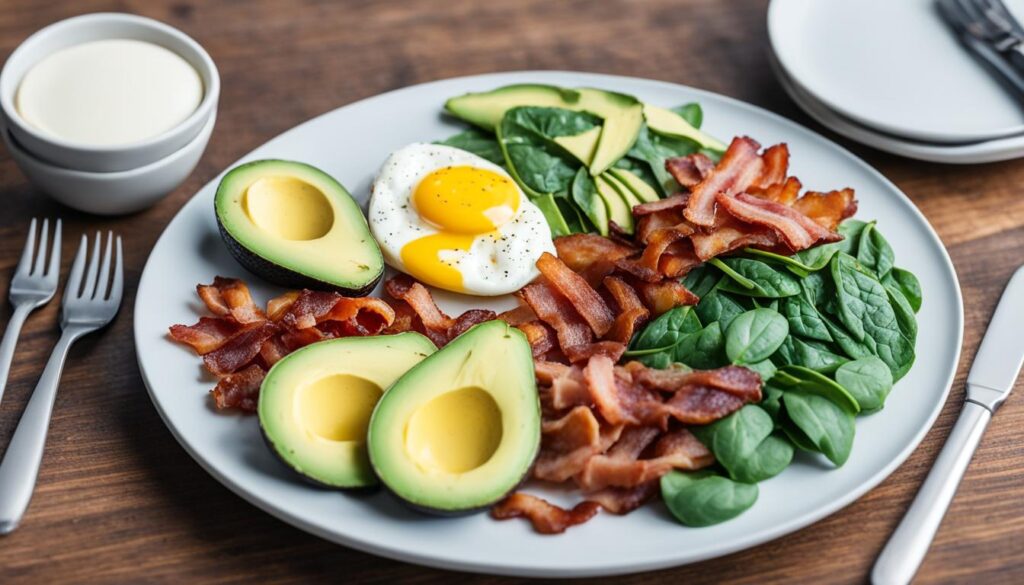
Sample Keto Menu for 1 Week
Looking for some delicious keto recipes to include in your meal plan? Here’s a sample keto menu for one week to keep you on track with your weight loss goals:
| Day | Breakfast | Lunch | Dinner |
|---|---|---|---|
| Monday | Eggs fried in butter with sauteed greens | A bunless burger with cheese, mushrooms, and avocado over greens | Pork chops with green beans sauteed in olive oil |
| Tuesday | Mushroom omelet | Tuna salad with celery and tomato over greens | Roast chicken with cream sauce and sauteed broccoli |
| Wednesday | Bell pepper stuffed with cheese and eggs | Arugula salad with hard-boiled eggs, turkey, avocado, and blue cheese | Grilled salmon with spinach sauteed in sesame oil |
| Thursday | Full-fat yogurt topped with keto granola | Steak bowl with cauliflower rice, cheese, herbs, avocado, and salsa | Bison steak with cheesy broccoli |
| Friday | Baked avocado egg boats | Caesar salad with chicken | Pork chops with vegetables |
| Saturday | Cauliflower toast topped with cheese and avocado | Bunless salmon burgers topped with pesto | Meatballs served with zucchini noodles and Parmesan cheese |
| Sunday | Coconut milk chia pudding topped with coconut and walnuts | Cobb salad made with greens, hard-boiled eggs, avocado, cheese, and turkey | Coconut chicken curry |
As you can see, the keto diet can be diverse and flavorful. With these recipes, you can enjoy a variety of meals while sticking to your keto meal plan. Remember to adjust portion sizes and ingredients based on your specific dietary needs and preferences.
Keto-Friendly Snack Options
Snacking can be an effective way to manage hunger and stay on track with your ketogenic diet. Here are some keto-friendly snack options to satisfy your cravings:
- Almonds and Cheddar Cheese: This combination provides a satisfying crunch and a good mix of healthy fats and protein.
- Avocado Stuffed with Chicken Salad: Avocado is a great source of healthy fats, and filling it with chicken salad adds protein.
- Guacamole with Low Carb Veggies: Enjoy guacamole with cucumber slices, bell pepper strips, or celery for a low carb snack.
- Trail Mix: Make your own trail mix with unsweetened coconut, nuts (such as almonds or walnuts), and seeds (such as chia or pumpkin seeds).
- Hard-Boiled Eggs: Hard-boiled eggs are an easy, protein-packed snack that can be enjoyed on the go.
- Coconut Chips: These crunchy and flavorful chips provide a satisfying snack option.
- Kale Chips: Baked kale chips are a nutritious and crispy alternative to traditional potato chips.
- Olives and Sliced Salami: This combination offers a savory and satisfying snack.
- Celery and Peppers with Herbed Cream Cheese Dip: Dip celery and bell pepper strips in a tasty and keto-friendly herbed cream cheese dip.
- Berries with Heavy Whipping Cream: Enjoy a small serving of berries with a dollop of heavy whipping cream for a refreshing and indulgent treat.
- Jerky: Look for jerky made from high-quality meats without added sugars for a protein-packed snack.
- Cheese Roll-ups: Roll up sliced cheese with deli meat for a quick and satisfying snack.
- Parmesan Crisps: Bake grated Parmesan cheese until crispy for a delicious and crunchy snack.
- Macadamia Nuts: Macadamia nuts are high in healthy fats and make for a satisfying snack.
- Greens with High-Fat Dressing and Avocado: Enjoy a salad with mixed greens, your choice of high-fat dressing, and sliced avocado.
- Keto Smoothies: Blend unsweetened almond milk, avocado, spinach, and your choice of low-carb sweeteners or flavorings for a refreshing keto smoothie.
- Avocado Cocoa Mousse: Mix avocado, unsweetened cocoa powder, and your choice of keto-friendly sweeteners for a rich and creamy dessert.
When snacking on a ketogenic diet, it’s important to keep track of your calorie and macro intake to ensure it aligns with your overall goals.
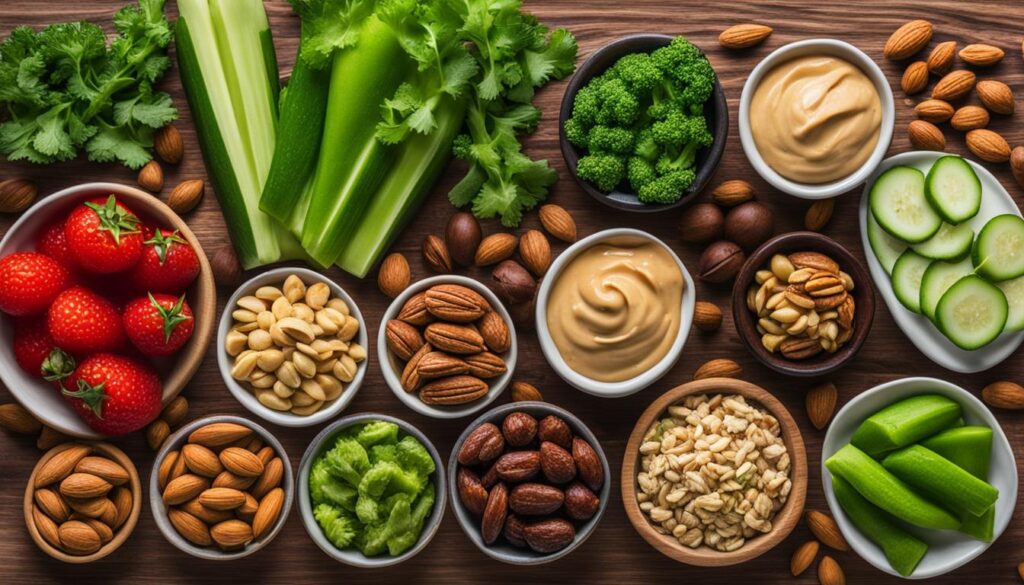
A Simple Ketogenic Shopping List
When following a ketogenic diet, it is essential to have a well-rounded shopping list that includes all the necessary ingredients. By focusing on fresh produce, healthy fats, and proteins, you can create delicious and satisfying keto meals. Here is a list of keto-friendly foods to add to your shopping cart:
Fresh Produce:
- Avocados
- Leafy greens (spinach, kale, lettuce, etc.)
- Low-carb vegetables (broccoli, cauliflower, zucchini, etc.)
Healthy Fats:
- Coconut oil
- MCT oil
- Olive oil
- Grass-fed butter
- Avocado oil
Proteins:
- Fatty fish (mackerel, tuna, sardines, salmon, etc.)
- Grass-fed beef
- Poultry (chicken, turkey, etc.)
- Pork
- Organ meats (liver, heart, etc.)
- Eggs
Nuts and Seeds:
- Almonds
- Walnuts
- Pecans
- Macadamia nuts
- Hemp seeds
- Chia seeds
- Flaxseed
Alternative Flours:
- Almond flour
- Coconut flour
Dairy Products:
- Grass-fed butter
- Full-fat cheese
- Heavy cream
- Greek yogurt (unsweetened)
Extras:
- Stevia or other keto-friendly sweeteners
- Keto-friendly condiments (mayonnaise, mustard, etc.)
| Food Category | Examples |
|---|---|
| Fresh Produce | Avocados, Leafy greens, Low-carb vegetables |
| Healthy Fats | Coconut oil, MCT oil, Olive oil, Grass-fed butter, Avocado oil |
| Proteins | Fatty fish, Grass-fed beef, Poultry, Pork, Organ meats, Eggs |
| Nuts and Seeds | Almonds, Walnuts, Pecans, Macadamia nuts, Hemp seeds, Chia seeds, Flaxseed |
| Alternative Flours | Almond flour, Coconut flour |
| Dairy Products | Grass-fed butter, Full-fat cheese, Heavy cream, Greek yogurt (unsweetened) |
| Extras | Stevia or other keto-friendly sweeteners, Keto-friendly condiments (mayonnaise, mustard, etc.) |
Remember to choose high-quality ingredients and avoid unhealthy fats and processed meats. With this comprehensive shopping list, you’ll have everything you need to prepare delicious keto meals and stay on track with your weight loss journey.
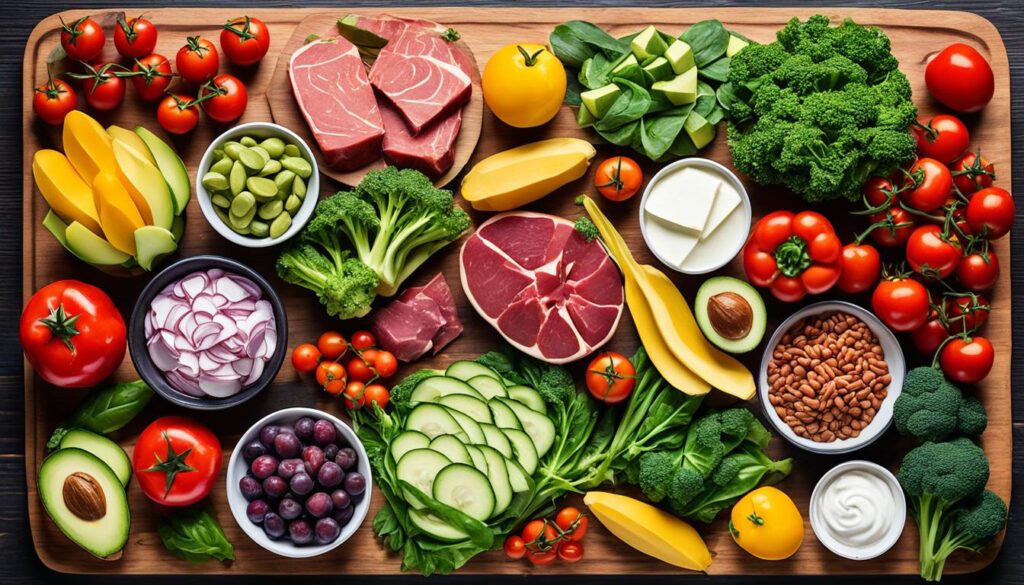
Conclusion
The ketogenic diet is a highly effective method for weight loss and improved health. By reducing carbohydrate intake and increasing consumption of healthy fats and proteins, individuals can achieve their weight loss goals while enjoying a variety of delicious and satisfying foods.
To successfully follow a ketogenic diet, it is important to create a well-planned keto meal plan. This involves incorporating nutrient-dense foods such as grass-fed dairy products, fatty fish, eggs, and fresh produce. Monitoring calorie and macro intake is essential for reaching weight loss goals.
For personalized guidance and support, consulting with a nutritionist can be incredibly beneficial. They can provide expert advice, help tailor a meal plan to individual needs, and ensure a balanced and successful keto diet journey (see my post here).
Remember, consistency is key when following a ketogenic diet. Stick to the plan, be mindful of food choices, and enjoy the numerous benefits that come with a ketogenic diet, including weight loss and improved overall health.
FAQ
What is the ketogenic diet?
The ketogenic diet is a high fat and low carb diet that helps the body achieve a state of ketosis, where it relies on fats for energy instead of glucose.
Is the ketogenic diet effective for weight loss?
Yes, research shows that ketogenic diets can be effective for promoting weight loss. However, they may not be more effective than other weight loss diets.
What does a keto-friendly meal plan look like?
A keto-friendly meal plan involves consuming high-fat foods, moderate protein intake, and limiting carbs. It includes foods like eggs, meat, full-fat dairy, nuts and seeds, avocados, and non-starchy vegetables.
Can I snack on a ketogenic diet?
Yes, snacking can help manage hunger on a ketogenic diet. Some keto-friendly snack options include nuts and cheese, avocados stuffed with chicken salad, and celery with herbed cream cheese dip.
What should I include in a ketogenic shopping list?
A well-rounded ketogenic shopping list should include grass-fed dairy products, healthy oils, avocados, nuts and seeds, fatty fish, and high-quality proteins like grass-fed beef and poultry.
Is it necessary to consult a nutritionist when following a ketogenic diet?
While it is not necessary, consulting with a nutritionist can provide personalized guidance and ensure a balanced and successful ketogenic diet journey.

